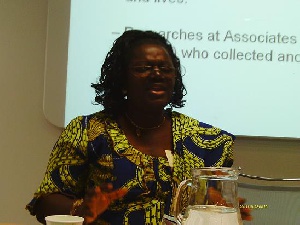Ghana ensures parity in education opportunities for females and males, says Deputy High Commissioner to UK - Mrs Elizabeth Nicol
Ghana's Deputy High Commissioner to the United Kingdom (UK), Mrs Elizabeth Nicol has said that Ghana has gone far in ensuring parity in education opportunities for females and males. She said this when addressing participants at a two day gender conference at the University of Cambridge, Faculty of Education.
The conference, which attracted over hundred and fifty Diplomats, gender activists and academics from all over UK, was organisation by the Council for Education in the Commonwealth supported by the Commonwealth Secretariat and the Cambridge University, under the theme: Education and the Transformation of young women's lives: Commonwealth Perspectives.
Mrs Nicol observed that the girl child in Africa is always attached to the kitchen and qouting from Dr Kwagyir Aggrey, she said his statement forms the basis of parents being influenced to send their girls to school in Ghana.
" the African is associated with the girl child being attached to the kitchen rather than going to school. It is in this light Dr. Kwegyir-Aggrey a native of the Gold Coast now Ghana and one of the century’s greatest educators made a poignant and timeless statement that “if you educate a man you educate an individual, but if you educate a woman you educate a nation” . Indeed this saying won the African proverb of the month in September 1999."
"It is believed that Dr. Aggrey used this statement to convince African parents who were more willing to enrol their male children in schools than they were for their daughters."
"Dr. Aggrey’s observations and pronouncements on the education of women has always motivated various Ghana governments to undertake interventions aimed at empowering women through education."
The Deputy High Commissioner pointed out that in Ghana men express their indebtedness to women by advising their wives to respect their mothers.
"In Ghana it is very common to hear husbands tell their wives to treat their mothers (mother in-laws) well because they owe what they (men) are to their mothers. This gives credence to George Washington’s assertion about his mother but in our case, it portrays the general perception and influence women have in the Ghanaian society."
She said Ghana is mindful of the influence of women in society and has therefore moved to ensure parity in education opportunities for females and males: "Mindful of the influence and the important role women play in the society, Ghana has gone far in ensuring parity in education opportunities for females and males."
According to Mrs Nicol, Ghana has shown commitment to creating opportunities and making life comfortable for the disable by passing the Disability Act 715. She also said the consititution frowns upon discrimination against the disable in Ghana.
"An estimated ten percent of Ghana’s population is disabled. In June 2006, Ghana’s parliament passed the persons with disability bill. Indeed the case for the disabled girl is termed as “double discrimination” because of the existing discrimination against women in education and the further discrimination they suffer for being disabled."
She stated that: "the passage of the disability bill therefore shows light at the end of the tunnel for the disabled girl in Ghana. Enshrined in the bill is equal access to education, accessibility to public places, employment, transportation in addition to many other rights."
The Deputy High Commissioner was accompanied by Mrs Wilheimina Asamoah, Head of Education and Miss Zuwera Ibrahimah, Head of Information at the High Commission.
Diaspora News of Tuesday, 1 November 2011
Source: Seidu Kpebu/GFM Radio, London

















